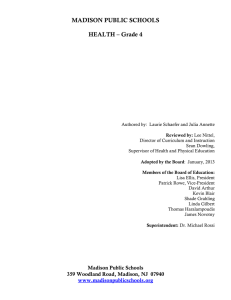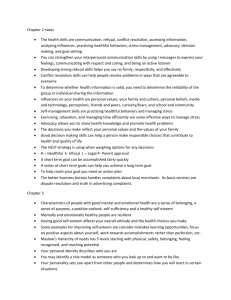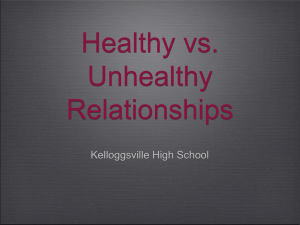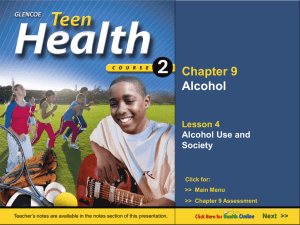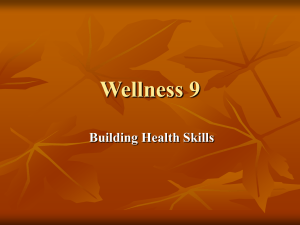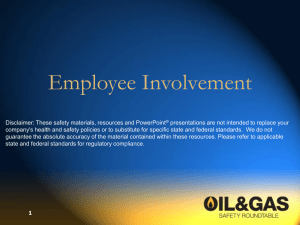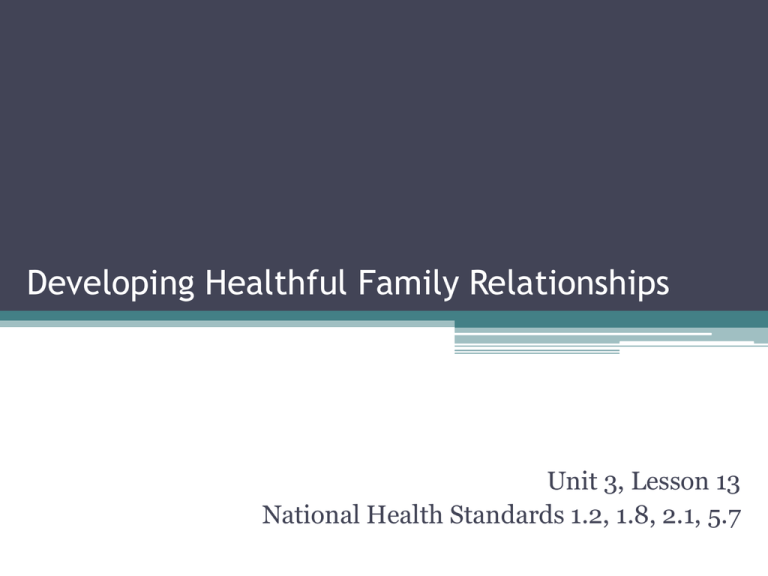
Developing Healthful Family Relationships
Unit 3, Lesson 13
National Health Standards 1.2, 1.8, 2.1, 5.7
Family Relationships
• Family
▫ Basic unit of society
▫ Group of people to which we belong
• Extended Family members
▫ All members of a family in addition to immediate
family members
• Healthful family
▫ Family that practices skills to promote loving,
responsible relationships
Roles of parents and guardians
• Teach children:
▫
▫
▫
▫
▫
Self-respecting behavior
Healthful attitudes
Effective communication
Clear sense of value
Responsible decision making
▫
▫
▫
▫
Conflict resolution
Coping skills
Delayed gratification
Expressing affection and integrating love and
sexuality
▫ Give and receive kindness
▫ Work ethic
▫ Respect for authority
• Teach by:
▫
▫
▫
▫
Setting example
Having discussions
Expecting behaviors and skills to be practiced
Enforcing consequences
Roles of grandparents
• Reinforcing behaviors and skills taught by
parents
• Help raise grandchildren
Roles of other family members
• Practice behaviors and skills taught by parents
• Help each other interact in loving and
responsible ways
Family continuum
• 2 extremes of family life
▫ Ideal and dysfunction
Dysfunctional
Family
Ideal
Family
1
1Meeks,
Linda. Heit, Philip. Page, Randy. Health and Wellness. McGrawHill Glencoe. 2008. p. 135.
• Dysfunctional Family
▫ Does not promote loving, responsible
relationships
• Ideal Family
▫ Does promote loving, responsible relationships
Healthful Family Relationships
• Learn self-respecting behavior
▫ Treat self in a healthy, responsible way
• Learn to value needs of others
▫ Know difference between self-respect and selfcentered ( fulfill personal needs with little regard
for others)
• Learn healthful attitudes toward sexuality
▫ Positive feelings and attitudes about body, sex
role, and relationships
• Learn healthful sex roles
▫ Behavior, attitude, value, and beliefs appropriate
for males and females on the basis of biological
sex
• Learn effective communication skills
▫ Positive ways to share feelings, thoughts, and
information with others
• Learn a clear sense of value
▫ Healthful standard or belief
• Learn to make responsible decisions
▫ Imitate, observe, evaluate, set guidelines
• Learn to resolve conflicts
▫ Listen and work to find a common solution
• Learn effective coping skills
▫ Skills to deal with life’s crises
• Learn to delay gratification
▫ Voluntarily delaying the reward for the
completion of a task or responsibility
• Learn to express affection
▫ Appropriate ways to express affection for loved
ones
• Learning a work ethic
▫ Attitude, discipline, motivation, and commitment
towards tasks to be completed
• Learn to respect authority
▫ Respect laws and rules of authority figures
Causes of Dysfunctional Families
• Chemical dependence
▫ Life depends on getting chemical over needs of
other family members
▫ Increases risk of violence, neglect, abuse
▫ May be an inherited dependency
▫ Co-dependent – lives without needed items to be
sure addict gets what they “need”
• Other addictions
▫ Any compelling desire to use or engage in a
behavior despite the consequences
▫ Food, gambling, shopping, etc.
• Perfectionism
▫ Compelling need to be flawless
• Violence in the family
▫ Use of physical force to injure, damage, or destroy
oneself, others, or property
▫ In a relationship when one member uses violence
to control the other member, it is domestic
violence
• Abuse in the family
▫ Harmful maltreatment of another person
• Child abuse
▫ Harmful maltreatment of a minor
• Spouse abuse
▫ Harmful maltreatment of a husband or wife
• Parent abuse
▫ Harmful treatment of a parent
• Elder abuse
▫ Harmful treatment of an aged family member
4 kinds of abuse
• Physical
▫ Physical injury to victim
• Emotional
▫ Belittling, bad mouthing, withholding affection
• Neglect
▫ Failure to provide proper care and guidance
• Sexual abuse
▫ Forced sexual contact – by physical force,
manipulation, or threat of harm
• Abandonment in a family
▫ Give up or refuse responsibility for those whom
they are legally bound to provide care
• Mental disorders in a family
▫ Behavioral or psychological syndrome or pattern
of a family member that takes special attention of
all family members
Co-dependent Relationships
• Have trouble with intimacy
▫ Deep and meaningful kind of sharing between
people
• Obsessing about the needs of others and
avoiding others
• Enmeshment
▫ Become so focused on the needs of another that
own needs go unmet
• Lack of interdependency
▫ Depend on each other, yet have own identity
Improve Relationship
• Intervention
▫ Seek professional help outside the family
• Therapy
▫ Individual or group
▫ Practice relating to one another in a safe
environment
Steps to Resolve Family Conflicts Responsibly
• Remain calm
• Set a positive tone
• Define the conflict and take responsibility of
own actions
• Listen to needs and feelings of others
• List and evaluate possible solutions
• Agree on a solution
• Communicate
Recovery programs
▫ Group that support members as they change
behaviors
• AA – Alcoholics Anonymous – group for
recovering addicts
• Al-Anon – group for families who have an addict
member
• Alateen – group for teens who have addicted
family members or friends

